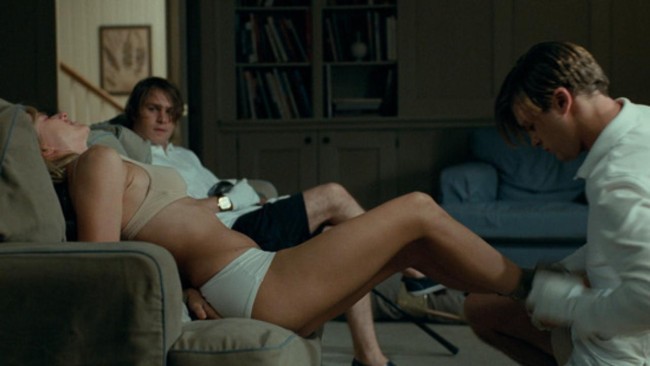Austrian filmmaker Michael Haneke thinks Americans are violent.
He mentions it in almost every interview regarding Funny Games—the subject of our topic today—how the original was meant for American audiences obsessed with boom! boom! and bloody finales, a movie that was supposed to confront us and our nasty lust for all that is gruesome, a movie that—sadly—never made it passed the art house crowd. The European one. Not American.
Most American movies feature violence that titillates rather than educates. They rarely involve the viewer with technique that incriminates, that gets the audience complicit in their gun-slinging heroes’ debauched behavior. The consequences of shooting someone, stabbing someone, lighting them on fire, severing their limbs, their digits, never leave an impression. It ruffles the tops of our hair and then flies off and dissipates into nothing.
Ten years later, having decided that interviews were no longer enough, Haneke embraced his disdain for our blood-and-guts culture and directed a shot-for-shot remake set in America.
The movie’s about two young men with imploring eyes, doe eyes, and the shortest tennis shorts, and the whitest t-shirts, two angelic killers who enter a house—almost on a whim, on a lark, for shits and giggles—and proceed to toy around with its inhabitants, who, too, are beatific in every way—a mama, a papa, and their son. Every last one of them as blond as can be.
Because everyone spoke either German or French in the original I was able to tip toe away from the horror and remain relatively unscathed. I could easily dismiss the atrocities depicted in the film as a “German thing”. Too far away from my region of the world for it to matter. But even Haneke’s cinematic approach struck me as clinical, unerring in its lack of sympathy for Anna and Georg’s misery. The film’s pacing crept at a glacial crawl, the camera held static, and most of the “action” happened off camera. Haneke’s shots focused on the characters’ faces, even when someone was acting up, getting shot, getting hogtied. He kept our eyes focused and away from the escalating atrocities at our periphery. Or he would cut to exteriors of the house where we could see how peaceful such a night of suffering could look from the outside. Idyllic. Untampered. Like any other lakeside house: gated and lit, with the occasional passing shadow. Nothing out of the norm. A tranquil community. A tranquil house owned by tranquil people.
Sure, I wanted blood. I wanted to see Anna’s and Georg’s heads blown off. I wanted to see Georg tortured. I wanted to see Anna’s naked body. I wanted it all. Because I expected it. Because I thought I was entitled to it. Violence happens every day. But not necessarily to or around me. Or rather, I don’t know a life of violence. Thankfully, I’m rarely—if ever—touched by it. So yes, I do sometimes find it entertaining, and I do find myself being one of those people at a movie who roots for the killer to have his or her way with their impossibly stupid cast of victims. Oddly enough—or maybe it shouldn’t be so odd—this time around, while watching the American version, I found myself cringing at the thought of violence, at the thought of a dead boy, of a naked and shrinking woman listening, helplessly, as Peter and Paul analyze her “jelly rolls”. I found myself running away from the movie, begrudging it for having the gall to confront me with so tasteless and so pointless—cosmically-speaking, of course—a scenario.
As soon as the film started—the American one—I recognized the voices in the car, I recognized the language. Several beats into the film I felt a rush of familiarity crash into me. The setting, the people, the tone. It was an abrupt realization. As soon as Haneke cuts his opening music from melodious classical to berzerker metal, I felt as if someone had clenched their fist around my gall bladder and squeezed it till it popped—dread and bile rising up my throat in equal measure. Right away—knowing what I know of the original and where the plot inevitably goes—I regretted putting the movie on. I didn’t want to see these familiar faces go through the torture that they would. Roth and Watts, Mr. Orange and Ann Darrow. Famous people. Smiling people. Beautiful people with beautiful amounts of money and charisma. Worldwide notoriety. Whereas the original pushed me away with its foreign language, this one embraced me with its English, it hugged me close to its chest, only to flip me around, grip my head like a vice, and force my eyes open to wriggle and writhe through the entire affair.
While Peter and Paul callously—and flippantly—play their games and pick Ann, George, and their little boy off, Haneke repeatedly shows his characters climbing over fences, sneaking through others’ homes, sailing across the lake to land at strangers’ docks—and! reaching through the screen and addressing us directly, invading us, invading our theaters, our temples, where no harm ever befalls the viewer. This film doesn’t believe in property, in security. Only as false notions. Ann and George are ensconced in walls and fences, with a lake acting as a safeguard to the rear, but it doesn’t matter, Peter and Paul still manage to invite themselves in with the bewitching application of soft voices and humble postures, and white skin and blond hair, the all-welcoming sight of the modern Aryan.
Whenever I hear news of a murder or genocide halfway around the world, impeded by an ocean or two, a handful of mountains and seas and civil wars, shrouded in a historical context that I have no comprehension of, the distance blunts my emotional reaction to the tragedy and instead of empathizing I reduce the incident to a passing comment or talking point at a dinner party, but if it touches me at home, within my gates, and it touches the people I recognize and talk to and understand, then it lands. The distance disappears and the violence becomes intimate. That’s when it becomes real.






